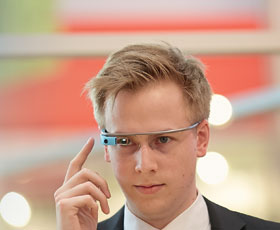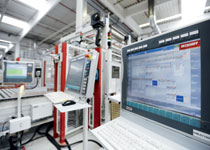

Nobilia manufactures an enormous number of kitchens per year, with over 580 000 produced in the two manufacturing plants located in Verl, Germany. That may be series production in the truest sense of the words, but the real specialty here is the customisation that is implemented at the same time. PC-based control from Beckhoff offers the ideal foundation for universal transparency of the parts and production data, allowing individual kitchens to be supplied flexibly and efficiently in a lot size of 1 – entirely in keeping with the ideals of Industry 4.0.
Around 2600 fitted kitchens leave Nobilia’s two production plants every day, making the company Europe’s largest manufacturer. If this figure alone is any indication of the high demands placed on the manufacturing processes, then according to Nobilia’s technical director, Martin Henkenjohann, it is made even clearer by the special market requirements: “Despite series production, we manufacture fitted kitchens entirely in accordance with the customer’s wishes, which means in a lot size of 1. In order to achieve this, we started way back in 1990 to keep all parts and production data transparent and universal over the entire manufacturing process – entirely in keeping with present-day Industry 4.0 concepts. That includes both the design data and the individual processing steps, so that we always know exactly where a particular piece of kitchen furniture is in the sequence of processes. This is the only way that we can meet the increasingly variable and specific customer requirements on the one hand and implement optimised and error-free freight transport with our own fleet of vehicles on the other.”
Industry 4.0 requires real-time data over the entire process
Modern Industry 4.0 concepts, and the higher flexibility in production that is attainable with them, are not possible without ensuring transparency of all machine and parts data. Henkenjohann explains what this means for Nobilia: “Real-time tracking capability over the entire process is the fundamental requirement. This starts by applying a barcode label that contains all necessary information about a piece of furniture, e.g. the front of a kitchen floor cupboard, as it moves from the anonymous prefabrication to the order-related production area. The production aspects with regard to further processing steps on various machines are just as important here as logistic details, such as the loading time and truck information or the delivery address. For example, each processing machine scans the barcode and retrieves the associated machining data from the central Oracle works database or from Web services.”
It is the transparency of the real-time data that makes the daily produced volume of 2600 individually manufactured kitchens possible. Depending on the format of the front, plus such things as the fittings and handle or panel variants, this results in an extremely wide range of floor, wall and tall cupboards. Regarding the logistics management of the virtually infinite variety of fitted kitchens, Henkenjohann explains: “The barcode of a drawer front, for example, contains the configuration of the entire drawer, including its width and depth, the height of the rear wall and the type of handle. The production facility accordingly supplies all required parts, initiates the correct processing sequences, and ensures that the desired drawer is placed in a logistic train ‘just in sequence’. The latter then drives to the assembly area, where the finished body of the cabinet is married to the drawer and other elements such as side-hung doors. Through real-time tracking, we know exactly where each part is in the production process at any time. That corresponds precisely to the Industry 4.0 approach.”

Manufacturing controlled by time units and aligned with loading dates
Planning the production of Nobilia kitchen furniture is by no means traditional. In fact, production is controlled by time units; i.e. the cupboards are tracked to determine which production sequence they are in and whether these sequences are correctly parallelised. Ultimately, all elements must enter the loading stream from a total of nine assembly lines with the right timing so that the individual fitted kitchen can be loaded completely and on time onto the correct truck. Henkenjohann comments: “The planning of an incoming customer order and thus the production control is taken care of by the dispatch department, which is actually the final link in the chain. This means that our vehicle fleet optimises the use of its truck volumes on the one hand and the route to the customers on the other.”
PC control as an open and efficient system
The idea of data transparency at Nobilia was hatched back in 1990 in order to meet the increasing demands on production. According to Henkenjohann, the decision in favour of PC-based control technology was clear from the outset: “Without the openness and high performance of PC Control, universal data storage would likely not have been possible at all, due to our heterogeneous manufacturing environment. Not only that, we have benefitted over all those years from a very close and fruitful co-operation with an expert partner in Beckhoff. In addition, the entire system is extremely flexible and thus sustainable, which means it is easy to adapt to changing requirements.”
With Beckhoff control technology and an Oracle works database developed in cooperation with Nobilia, a central, closely meshing link between ERP and design software has been created. In this way, the requirements of a historically grown and accordingly heterogeneous production landscape can be satisfied. At the same time, it was and continues to be possible to tap efficiency potential through the increasing integration of stand-alone solutions. A technical quantum leap in this context was the introduction of TwinCAT, the Windows-based automation software from Beckhoff. Matthias Gehle, Beckhoff expert for networks and systems: “With TwinCAT, an entire system no longer had to be completely controlled from one control computer. Today, for instance, it is easy to connect up to seven Industrial PCs together via TwinCAT and ADS communication, for example for several drilling machines, a distribution system and additional machining stations. Larger production units are created in this way, so that basically only a few equipment types, such as a tall cupboard assembly belt or a drawer unit, have to be regarded. For each of these plant types there is a pre-defined, customised TwinCAT application available, which only needs simple parameterisation to be adapted. On the one hand, this allows existing knowledge to be transferred to all plants without great effort, and on the other, software engineering can be much more efficient.”
Universal PC-based control technology
Nobilia uses PC control from Beckhoff universally throughout both of its manufacturing plants, from the EtherCAT I/O system and motion control through to the control cabinet Industrial PCs (IPCs) and control panels with TwinCAT PLC/NC. Even the few older machines with conventional PLC technology can be integrated with PC-based control. Gehle summarises the results as follows: “A homogeneous data flow can be achieved despite the very heterogeneous machine pool. The data is held in the central Nobilia database. Special high-level language applications developed by Beckhoff that are implemented in the production plants communicate with this database and supply the respective plant controllers with adapted information. Over all these years that has been the key to the continuous improvement of efficiency in production.”
Further efficiency potential on the way to Industry 4.0
Industry 4.0 is a concept that will only be fully implemented in the coming 10 to 20 years. Nobilia has already implemented it to a great extent today, but Henkenjohann sees some potential for further development in the short and mid-term: “Currently, we are using RFID and RTLS (real-time locating systems) on a test basis with the goal of making the identification of the furniture pieces more variable in comparison with the barcode system and also to provide them more clearly with all necessary information. In addition, our production control will benefit from TwinCAT 3 and the multi-core IPC technology which it optimally supports.”
For more information contact Kenneth McPherson, Beckhoff Automation, +27 (0)11 795 2898, [email protected], www.beckhoff.co.za
| Tel: | +27 11 795 2898 |
| Email: | [email protected] |
| www: | www.beckhoff.com |
| Articles: | More information and articles about Beckhoff Automation |

© Technews Publishing (Pty) Ltd | All Rights Reserved